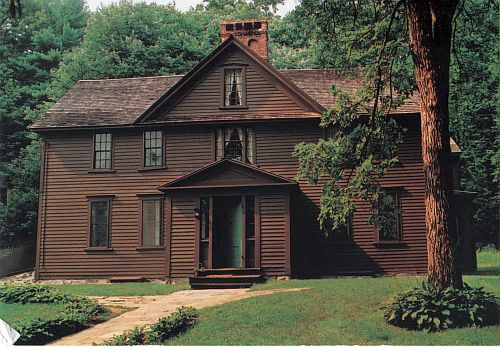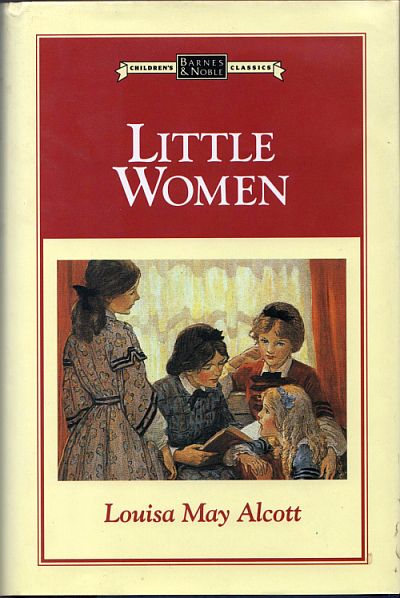 | Concord, Massachusetts Remodeled from two buildings built before the Revolutionary War, this house was the home of the Alcott family from 1858-1877. Here Louisa May Alcott wrote Little Women in 1868. Photograph by Bonnie McGrath |
 tek's rating:
tek's rating:  ½
½
Little Women, by Louisa May Alcott (pub. 1868-69)
Amazon; B&N; Goodreads; Penguin Random House: Scholastic; StoryGraph; TV Tropes; Wikia; Wikipedia
So I guess there are two volumes, "Little Women" (1868) and "Good Wives" (1869), which have since been published as a single book, "Little Women," which is divided into "Part First" and "Part Second." In any event, it was first published more than a century before I was born. I finally got around to reading it in 2016-17. I started in the first week of November, and planned to finish it around Christmas. That didn't happen, so I pushed my plan back to New Year's. That also didn't happen. By the start of March, it had become apparent to me that finishing it sometime within that month would be easy, and I also considered it apt (since the last name of the main characters is "March"). So, I finally finished it on March 31.
Part First
The story begins on Christmas, though I'm unsure of the exact year. I just know it was during the American Civil War. There are four sisters: Meg (age 16), Jo (age 15), Beth (age 13), and Amy (age 12). They live with their mother, whom they affectionately call "Marmee." Their father, a minister, is away serving as a chaplain in the Union Army. The family was once fairly wealthy (and they still have a wealthy Aunt March), but their father had lost his immediate family's money in some charitable act. So now, Marmee and all the girls do some work to support the family (though they greatly look forward to Father's return from the war). Oddly, though, they still employ a servant named Hannah. (I kind of got the impression at some point that there might have been another servant who was named, but had no lines or actual appearances in the story. But I may have been wrong about that.) It's something I often notice when watching "period pieces," that somehow formerly wealthy families that are now poor still manage to have servants. But whatever. Anyway, the book gives an impression of each girl's personality. Meg is the most traditional, in terms of gender roles, just hoping to get married someday. Jo is the "tomboy," a writer, and the most hot-tempered one. Beth is the sweetest and shiest of the four, the one everyone loves best, the most musically inclined, and the least inclined to ever leave home. Amy is the "baby" of the group, an artist, and perhaps the most vain. But they're all basically good people, who always strive to become more moral than they already are. It's a very charitable family, always (or usually) thinking of others before themselves. But, while the girls may hope someday to have more money and finer things (and may sometimes be jealous of their wealthier friends, especially Meg), they are quite good at entertaining themselves and finding value in life's smaller pleasures. I also remember at some point in my reading, I got a sort of mixed sense of the Marches being at once a better example of good Christians than one often sees, these days, and yet in some ways perhaps a bit too devout. Though now that I'm finished reading and I'm working on my review, I'm afraid I can't quite recall what made me think the latter thing.
Anyway... lots of things happen, and I don't want to mention any but the most essential plot points. The Marches have a next door neighbor named Mr. Laurence, who is very rich, but kind of a recluse. His orphaned grandson, Theodore, comes to live with him after his parents die, and he soon befriends the Marches, who mostly call him "Laurie," though Jo sometimes calls him "Teddy" (and she's the only one who's allowed to do so). Laurie is between Meg and Jo's ages, and while he's friends with all the girls, and respectful of Marmee, he becomes particularly close with Jo. He's a bit of a rascal, which Jo often chides him for, and she tries to mold him into a better person. But he's never really a bad sort, I'd say. And I always thought it was pretty clear that he and Jo would eventually become a couple... though I don't want to spoil whether or not that assumption turns out to be right. Either way, they do make very good friends. And through Laurie's association with the Marches, his grandfather eventually becomes more sociable.
Another important plot point is that the Marches receive a telegram from Washington, D.C., informing them that Mr. March has become very sick. Mrs. March goes there to tend to him, leaving the girls in the care of Hannah, with Mr. Laurence frequently looking in on them. She's accompanied to Washington by John Brooke, who is Laurie's tutor, and possible love interest to Meg. While they're away, Beth becomes very ill herself, and nearly dies. But she eventually recovers, as does Mr. March. Both parents finally return, along with John. And... I'm leaving out lots of things that happen in each girl's life. But the volume ends with Meg and John getting engaged, though it will be three years before they marry.
Part Second
It begins with some narration by Alcott, to ease us through the three years that the story skips over, before segueing into Meg and John's wedding. (Alcott actually does a fair bit of narrating, throughout both volumes, which TV Tropes calls "Author Tract," but which I thought of as sort of breaking the fourth wall. Either way, I mostly enjoyed it.) As with part one, part two includes chapters focusing on each of the girls individually, but Jo always seems to be the main protagonist, with the most clearly drawn personality (and my favorite character). I really do want to avoid too many spoilers, but I must say that at one point, Amy goes on a trip to Europe. And Jo goes to New York, to stay with a friend of the family named Mrs. Kirke, who runs a boarding house. There, Jo teaches Mrs. Kirke's children, as well as working on her own writing career. Also, she meets another boarder, Professor Friedrich Bhaer, who teaches German (his own native language, having moved from Berlin some time ago). He was somewhat older than Jo; I'm not sure how old exactly, but I'd guess at least fifteen years older, maybe twenty, though I also think he was at least ten years younger than her parents, but I'm not sure of their ages, either. I just know that at the end of the book, Marmee is sixty. But that's getting ahead of myself. Anyway, I'm not sure how many years part two covers, but probably something like a decade. And... while in New York, Jo becomes good friends with Professor Bhaer, who is rather poor, but very intelligent and kindly, liked by everyone. One thing I didn't like about him was that at one point, he made Jo feel ashamed of her writing a certain kind of stories that sold well. I really didn't feel he had any right to do so; there was nothing particularly scandalous about the stories' subject matter, I think, but Bhaer apparently had a different opinion, and thought them beneath Jo. I suppose she sort of thought so, herself, and saw his disappointment in her as the push she needed to stop writing them, which perhaps was what she wanted to do, anyway. Even so, it pissed me off. But other than that one thing, he really is a pretty decent fellow, I guess. Anyway, eventually Jo returns home. (Which, btw, it's never mentioned exactly where the Marches live, but it's surely somewhere in New England.)
Well, I'm not sure what else to say. Meg and John have twins, a boy called Demi and a girl called Daisy, and one of the later chapters is devoted to them. And the final chapter breezes through about five years without going into too much detail, before concluding with the events of Marmee's sixtieth birthday. But other than that, there are a few major plot points from part two that I really don't want to spoil. I expect someday I'll read the sequel, "Little Men," and at that time I'll have to spoil the plot points I'm excluding from this review.
Anyway, I definitely thought it was a pretty great book. Quite feminist for its time, even if perhaps somewhat less so, by today's standards. And while specific examples have pretty much escaped my powers of recollection, in a general sense I did sometimes find the book a bit too "preachy," though that's understandable, considering the main characters had a minister for a father. (But he was almost more of a philosopher than a strict theologian, I think.) And... I feel like I should say more. I really liked the writing style, and I generally liked the characters (particularly Jo). And overall, it's just a nice story.
There have been several film adaptations. Thus far the only one I've seen is from 1994, but I'd also like to see the one from 2019.
I bought this book at a thrift store. It was some time after I started reading it that I discovered this post card stuck somewhere in the middle of the book (some ways past where I was in my own reading). I scanned the front of the card, and I'll include the text from the back.
 | Concord, Massachusetts Remodeled from two buildings built before the Revolutionary War, this house was the home of the Alcott family from 1858-1877. Here Louisa May Alcott wrote Little Women in 1868. Photograph by Bonnie McGrath |